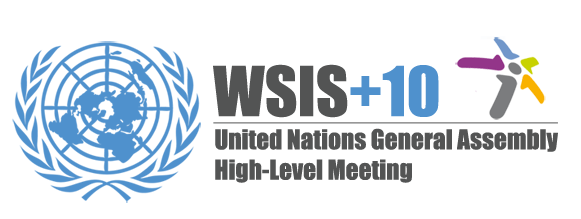UN Member States adopted the World Summit on the Information Society Review (WSIS+10) outcome document, which aims at bridging the digital divide, ensuring freedom of speech, and addressing internet governance to achieve the 2030 Agenda for Sustainable Development.
The document also notes governments' ambition to move beyond “information societies” to “knowledge societies,” in which information is not only created and disseminated, but put to the benefit of human development.
It also encourages a prominent profile for information and communications technologies (ICT) in the Technology Facilitation Mechanism mandated by the Addis Ababa Action Agenda (AAAA).
 17 December 2015: UN Member States adopted the World Summit on the Information Society Review (WSIS+10) outcome document, which aims at bridging the digital divide, ensuring freedom of speech, and addressing internet governance to achieve the 2030 Agenda for Sustainable Development. The document also notes governments’ ambition to move beyond “information societies” to “knowledge societies,” in which information is not only created and disseminated, but put to the benefit of human development. It also encourages a prominent profile for information and communications technologies (ICT) in the Technology Facilitation Mechanism mandated by the Addis Ababa Action Agenda (AAAA).
17 December 2015: UN Member States adopted the World Summit on the Information Society Review (WSIS+10) outcome document, which aims at bridging the digital divide, ensuring freedom of speech, and addressing internet governance to achieve the 2030 Agenda for Sustainable Development. The document also notes governments’ ambition to move beyond “information societies” to “knowledge societies,” in which information is not only created and disseminated, but put to the benefit of human development. It also encourages a prominent profile for information and communications technologies (ICT) in the Technology Facilitation Mechanism mandated by the Addis Ababa Action Agenda (AAAA).
The UN General Assembly (UNGA) held the High-Level Review Meeting on the implementation of the WSIS, on 15-16 December 2015, in New York, US.
Through the outcome document, Member States commit to harnessing the potential of ICT to achieve the 2030 Agenda, noting that ICTs can accelerate progress across all 17 Sustainable Development Goals (SDGs), and they request UN entities facilitating WSIS action lines to review their reporting and work plans to support the Agenda’s implementation.
The text: recognizes the “critical” importance of private sector investment in ICT infrastructure, content and services, and encourages governments to create legal and regulatory frameworks conducive to increased investment and innovation; reaffirms that democracy, sustainable development and respect for human rights and fundamental freedoms, as well as good governance at all levels, are interdependent and mutually reinforcing; resolves to strengthen respect for the rule of law in international and national affairs; and calls on States to take all appropriate measures necessary to ensure the right to freedom of opinion and expression, the right to peaceful assembly and association and the right not to be subjected to arbitrary or unlawful interference with privacy, in accordance with their human rights obligations.
It highlights the need to improve affordability, access, education, capacity-building, multilingualism, cultural preservation, investment and appropriate financing; welcomes the opportunity afforded by sustainable energy to decouple the growth of ICTs from contributions to climate change; and calls for a global culture of cybersecurity to foster trust and security in the information society.
The outcome document acknowledges that a gender divide exists as part of the digital divide, and encourages all stakeholders to ensure the full participation of women in the information society and women’s access to new technologies, especially ICTs for development. Particular attention should also be paid, the outcome continues, to addressing the specific ICT challenges facing children, youth, persons with disabilities, older persons, indigenous peoples, refugees and internally displaced people, migrants and remote and rural communities. It states that speed, stability, affordability, language, local content and accessibility for persons with disabilities are now core elements of quality.
The outcome document reaffirms the value and principles of multi-stakeholder cooperation and engagement, especially with balanced representation from developing countries, as vital in developing the information society.
The UNGA agreed that it will hold a High Level Meeting on the overall review of the implementation of WSIS outcomes in 2025, and recommends that the 2025 meeting’s outcome be an input to the review process for the 2030 Agenda for Sustainable Development. [Outcome document of high-level meeting of the General Assembly on the overall review of the implementation of the outcomes of the World Summit on the Information Society] [UN Press Release] [UNESCO Press Release]